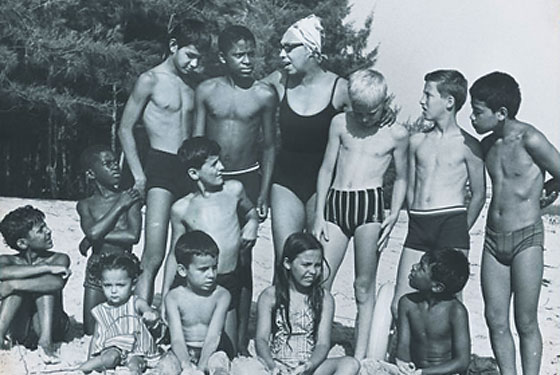
She was an internationally famous singing star and one of the most photographed women in the world, notorious for her sexually provocative songs and stage performances. A narcissist who liked to shock the public, she took both male and female lovers—she claimed they numbered in the thousands. At the age of 50, with her career stalled and her tabloid fame overshadowing her professional achievements, she set out to reinvent herself as a universal mother who rescued orphans from around the world. She was Josephine Baker, and she came up with this idea long before Madonna or Angelina Jolie did.
It was easier when she did it. Madonna has been widely derided for attempting to adopt a 3-year-old girl from Malawi after adopting a then-13-month-old Malawian boy in 2006, and so far the Malawian High Court has denied her petition because she didn’t meet the country’s eighteen-month residency requirement. But Baker really went shopping for kids as if she were at Costco. Such were the fruits of privilege in the fifties. She was an expatriate black girl from St. Louis who became an international sensation in 1926 when she danced barefooted and bare-breasted at the Folies Bergère wearing a skirt of bananas. Over the next two decades she was hardly ever out of the public eye. She made movies and recordings, and was awarded the Légion d’Honneur for spying for the French Resistance during World War II. She was also a pioneering civil-rights activist and the only woman invited to speak at Martin Luther King’s March on Washington. Married four times, she was linked romantically with Charles de Gaulle and Frida Kahlo.
“By the time she was 50 years old, the world had changed and she hadn’t,” says one of her adopted sons, Jean-Claude Baker, a Manhattan restaurateur and author of Josephine: The Hungry Heart. “She could no longer attract a younger audience.” Although she was still somewhat of a star in Europe, she was regarded as camp here. That’s when she came up with a plan to assemble a “Rainbow Tribe” of children who would live together in harmony in a castle, Les Milandes, that she bought in the French countryside. “Motherhood gave her career a different track,” he says. “She was no longer an aging sex symbol. You don’t judge a mother by how firm her breasts are.”
Some of Baker’s tribe she legally adopted, some she bought, one or two she absconded with. Akio and Janot were legally adopted from Japan; Jarry was bought for $5,000 from Finland. A black child from Colombia died in her hotel room, so she went back to the orphanage and took his younger brother. Koffi was African, from the Ivory Coast; Mara was a red-complexioned South American Indian from Venezuela. She changed the name of Alain Jean-Claude, whom she took from a foster home in Paris, to ¬Moises so it would sound as if he were Jewish, then fed him kosher food and made him wear a skullcap. An Algerian child named Jacques was renamed Brahim and declared a Muslim. She adopted one little boy after hearing he had been found in a garbage can on Christmas Eve and named him Noel.
Baker’s motherhood follies put Madonna’s (and Angelina Jolie’s) modest adoption desires in some perspective. Yet for all the media fuss, the reality is that most U.S. celebs adopt native-born kids (Diane Keaton, Steven Spielberg, Tom Cruise), and there are only around 20,000 foreign children brought to this country through adoption each year. As for Malawi and its hundreds of thousands of aids orphans, only ten children from there have been adopted to the U.S. since 2000.
In the sixties, Josephine, down on her luck, moved to a three-room flat in Paris with the tribe. Still, she did a pretty good job with the kids. Mara works as a tax inspector in France. Akio works in a Paris bank, and Janot is a gardener in Monte Carlo. Luis, from Colombia, sells insurance and has two children of his own. Jarry manages Chez Josephine. “None of us wound up in jail,” says Jean-Claude.
Have good intel? Send tips to [email protected].